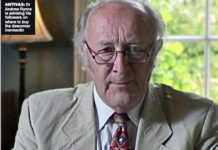By Michael O’Farrell – Investigations Editor
SCENARIO 1: You are a senior nurse in a nursing home.
It’s the middle of the night and you’re between PPE changes when a patient calls out in pain.
You run to glance through the door to their room and see your patient on the floor, distressed and flailing wildly.
There’s no-one else available to help – your team has been hopelessly stretched by months of fighting Covid.
You know the patient – who is liable to injure themselves or worse at any moment – is Covid positive.
What do you do – waste vital minutes suiting up properly or rush in to help as you are?
SCENARIO 2: You are a hospital clinician working in an acute setting.
Your patient has stopped breathing. A year ago your team would commence CPR immediately and perhaps warn ICU to prepare for a new admission.
But it will take four minutes to don suitable PPE to protect yourself from aerosol exposure – and ICU is almost full of Covid patients.
What do you do?
SCENARIO 3: You are an ICU consultant.
You have vast experience in making judgments about life and death. But these are unprecedented times.
There are patients who in normal circumstances would receive ICU care and your team may have to decide which ones don’t get it. How will you decide?
SCENARIOS like these are now playing out daily in hospitals, nursing homes and residential institutions throughout the country.
There are nurses who, when required, put themselves at risk without a moment’s thought.
And there are clinicians who make decisions they know would have been different a year ago.
Initially I was in shock I got it – but then came the relief
FOR those on the front line it all takes a toll – even though there’s no time to acknowledge it.
For many, the impact hits home only when they themselves receive a positive test result.
‘The only way to describe it is going around with an axe hanging over your head since March,’ one nursing home nurse told the Irish Mail on Sunday.
‘Just waiting, waiting, waiting and getting tested every two weeks and waiting, waiting, waiting for that result to come in.’
But then came a positive test. ‘Initially I was in awful shock. I couldn’t believe I had gotten it after working so hard for so long and not getting it. But afterwards it was almost like a sense of relief. I have it now, I’ll get over it and then I don’t need to worry about myself.’
For most struck down with Covid in the workplace, there are others back home to worry about too.
‘When we got the kids’ results back as negative – that relief was unbelievable. I actually hadn’t cried as hard since my dad died.’
Having borne the brunt of the first wave, nursing homes and older people are once again in the eye of the storm.
According to the Health Protection Surveillance Centre there were more than 100 new outbreaks in nursing homes since the beginning of the year.
New outbreaks in long-term residential care centres have topped 125 this year.
‘It’s definitely getting worse,’ one nursing home owner told the MoS.
In April he lost more than 10 patients within days in one of his nationwide facilities. Now Covid is back in the same home again.
But this time it’s also in another of his facilities which had escaped infection in the first wave. Nearly 10 residents have died. ‘It was two weeks before vaccination – an absolute disaster,’ said the owner.
‘A group of our carers went partying over Christmas. They were asymptomatic and tested positive in the round-ups but it was too late.’
But the owner is complimentary about his workforce. ‘They are hugely resilient – most of them. They are just good people,’ he said.
But an added complication this time around is the infectiousness of the new UK strain.
One carer said: ‘It’s far more contagious. Everybody is wearing PPE and we’re still at massive risk. Everybody is overworked, everybody is exhausted, everybody is extremely stressed.
‘Everybody’s nerves are raw so there is a risk of conflict just because of stress but as a team we have definitely become closer because of this.’
CARERS ARE ‘STRETCHED TO LIMIT’
THE country’s 10,000 homecare workers have also been stretched to the limit.
They are funded by the HSE to care for some 20,000 vulnerable clients in their own homes.
But Covid cases among these workers stood at 120 two weeks ago. By last week that figure had risen to 204 and this week there were 248 cases.
Among clients, there were 46 cases recorded two weeks ago. That had risen last week to 108 and this week cases among clients rose to 168.
‘Carers continue to bear quite a large burden in managing this virus which is quite an extraordinary effort,’ said Joseph Musgrave of Home & Community Care Ireland, pictured.
But unlike other health sector workers in nursing homes and hospitals, home carers are not yet being mass vaccinated. ‘The figure that is most concerning is that out of 10,000 carers, only 258 have been vaccinated so far. That’s disappointing,’ said Mr Musgrave.
‘Carers are on the front line of this virus. It’s in our communities and I would hope that the next priority is now really focused on the community because these figures show that they have not prioritised vaccinating frontline workers in the community.
‘On the HSE vaccination portal you can select which nursing home you work for but if you work in home care, you can’t select which provider you work for. You can’t even select you work in home care. That to me is indicative of a system that doesn’t fully treat home carers as first-class citizens.’
Mr Musgrave also noted that the HSE is now seeking to avoid discharges from hospitals to nursing homes in an apparent bid to avoid outbreaks.
‘I’m starting to receive reports from members who are being asked by the HSE to provide more care to people being discharged from hospital,’ he said. ‘I think there is a preference to discharge people to the home and we have never seen that preference more strongly expressed than during this virus. Wherever possible they want people to go back home rather than to a residential care setting.’
He’s also concerned at suggestions that home care services may be suspended to allow staff transfer to struggling nursing homes.
‘Some of the early reports I’m hearing are that the HSE might suspend home care in order to free up capacity to send staff to nursing homes.
‘I don’t understand why you would suspend one of the most resilient healthcare models during the pandemic and ask their staff to go into nursing homes.
‘It’s a slightly extraordinary thing to ask of the home care sector at a time when it has never been as stretched as it is right now.’
‘Really what our job should be is to protect the 20,000 older and vulnerable people.’
‘We’re pulling together but holding out for an ICU plateau’
THOSE on the Intensive Care Unit frontline all face similar difficulties.
‘Everyone is stressed and everything is tight within the unit but when you actually go in there and are working there I think everyone pulls together very well,’ Beaumont ICU consultant Dr Alan Gaffney told the Irish Mail on Sunday.
Every day, Dr Gaffney and his team leave their families behind and do battle to save the sickest of the sick in Dublin’s Beaumont Hospital.
Beyond the elevator doors, on the lower ground floor of the hospital, the ICU is the last hope of many Covid patients.
Amid the machines and ventilators many lie prone on their bellies – a marked difference to what a typical ICU would have looked like a year ago.
‘During Covid, you see a lot more of that than you would in other times,’ said Dr Gaffney.
Right now all ICUs throughout the country are close to the limits of their capacity.
‘At the moment the country is providing critical care to more patients than we have critical care bed doctors and nurses for,’ said Dr Gaffney.
They are doing this by getting help from redeployed staff and by changing the criteria for ICU admission.
Many patients who would ordinarily have been automatic candidates for ICU a year ago, are now being treated elsewhere.
‘There are patients getting highlevel oxygen support on the wards that we would, in other times, consider bringing to ICU,’ he said. ‘There are more patients on the brink of needing ICU care being looked after on the wards.’
But Dr Gaffney is adamant that so far his team have not had to face the kind of black and white, life and death decisions often portrayed during the Covid crisis.
‘People often put forward a scenario where you’ve two patients and have to decide between them. That’s an unlikely scenario to ever arise,’ he said.
‘It’s much more likely that we would continue to offer ICU care to as many people as needed but then dilute care to everyone.’
Some worry that ICU care is already being diluted – as the system hovers perilously close to its 350-bed surge capacity.
‘There’s also a concern now that the one-on-one care that would normally be given to patients in ICU now is being diluted a little bit,’ said Dr Gaffney.
‘There’s definitely a concern that when we get to the 350 beds that maintaining the standard of care we are all used to is going to be very difficult.
‘We haven’t had to make any decision to move someone to ICU where ICU wasn’t available.’
But he is worried about the continued rise in ICU admissions which has not slowed as community transmission decreases.
‘It’s difficult to watch the numbers steadily increase day after day and we are holding our breath for when we get to the point where we do reach a plateau,’ he said.
Medical staff ‘are tired and fear new strains as third wave bites’
THOSE who speak for health workers say employees are shattered as the third wave of Covid bites.
‘People are tired. They’re tired of working,’ said Amanda Phelan, Trinity College Professor of Ageing and Community Nursing.
Professor Phelan said the first spread of coronavirus had prepared some for the present peak.
‘That experience was almost like a bolstering experience for the third wave because you know what it’s like, you know what it is and you know what it can do,’ she said.
‘But a fatigue has set in. People are fatigued, particularly if they are dealing with Covid environments because they have just had months of this at all levels of the system.’
Professor Phelan also acknowledged the fears workers have for the future – despite the hope offered by vaccination.
‘I would say that there is a bit of concern about new strains emerging. Currently, the commentary is that the vaccine can address these but that’s probably not always a given. It depends on what way the strains develop,’ she said.
‘In the back of everyone’s mind are questions about whether other strains emerge which might be so hybrid that the vaccine doesn’t get them.’
Unions, meanwhile, are questioning whether workers are being properly protected since it emerged that more than 5,000 health workers have been infected in recent weeks.
‘There are clearly cracks in the armour of the defence systems. The damage that that is doing is incredible,’ said Siptu health sector chief Kevin Figgis.
‘There is a question about the environment they are working in. About the suitability of the capability of the PPE they’re wearing. How are 5,000 people getting infected when the HSE is spending billions on supposedly protective equipment?’ he asked.




